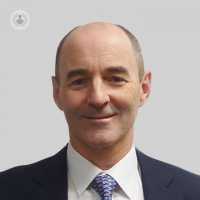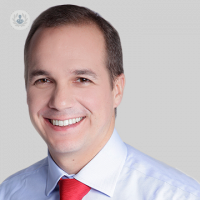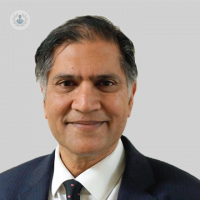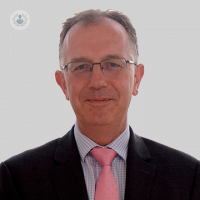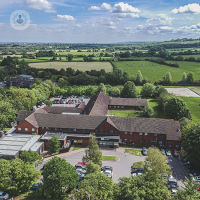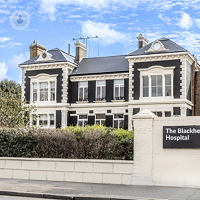What is middle ear surgery?
Middle ear surgery is a series of surgical interventions to treat problems in the tympanic membrane, in the chain of tiny interconnected bones (the hammer, anvil and stirrup) and in the mastoid cells (cavities of the temporal bone).
There are two major surgical procedures: tympanoplasty and mastoidectomy. Tympanoplasty involves ossiculoplasty (repairing the bones) and myringoplasty (closing a hole in the eardrum).

Why is middle ear surgery performed?
Middle ear surgery is recommended for treating middle ear problems. Tympanoplasty is recommended for large eardrum perforations or middle ear infections such as acute or chronic otitis media that cannot be cured with antibiotics.
Mastoidectomy is an operation to remove the flat air cavities of the skull behind the ear (temporal bone) in order to treat infections of the mastoid portion in that part of the skull, to treat complications of otitis media, abnormal bone growth, cholesteatoma (skin cell cyst in the middle ear), or to place cochlear implants.
What does middle ear surgery involve?
In middle ear surgery, The middle ear is accessed through a cut behind the ear or through the ear canal so that the appropriate procedures can be performed, depending on the injury. The procedure may involve removing any infection or dead tissue in the eardrum, placing a graft to reconstruct the tympanic membrane, or placing a prosthesis to replace a damaged bone.
What's involved in the preparation for middle ear surgery?
Before middle ear surgery, the specialist, or otorhinolaryngologist, will check to make sure you don’t have an ear infection. This will require several tests, including an ear examination and a hearing test. In some cases, a CT scan of the head may also be needed.
You must also consult your doctor about medication you can or cannot take. For example, you may need to stop taking certain drugs such as aspirin, anti-inflammatories or blood thinners a week prior to surgery.
What's involved in post-middle ear surgery after care?
To ensure proper recovery after middle ear surgery, you should avoid:
- Sneezing too hard, or holding in a sneeze;
- Getting water in your ear for 1 - 3 months - taking a bath is advised over having a shower, and you should wait until the packing is removed;
- Flying;
- Swimming or diving;
- Lifting weights and excess tension;
You will have to wait a few weeks after the operation to know whether your middle ear surgery has been successful or not. Full recovery from middle ear surgery will take approximately four weeks if the post-operative care guidelines have been followed according to your specialist's recommendations.
11-13-2012 05-03-2023Middle ear surgery
Mr Michael Pringle - Otolaryngology / ENT
Created on: 11-13-2012
Updated on: 05-03-2023
Edited by: Karolyn Judge
What is middle ear surgery?
Middle ear surgery is a series of surgical interventions to treat problems in the tympanic membrane, in the chain of tiny interconnected bones (the hammer, anvil and stirrup) and in the mastoid cells (cavities of the temporal bone).
There are two major surgical procedures: tympanoplasty and mastoidectomy. Tympanoplasty involves ossiculoplasty (repairing the bones) and myringoplasty (closing a hole in the eardrum).

Why is middle ear surgery performed?
Middle ear surgery is recommended for treating middle ear problems. Tympanoplasty is recommended for large eardrum perforations or middle ear infections such as acute or chronic otitis media that cannot be cured with antibiotics.
Mastoidectomy is an operation to remove the flat air cavities of the skull behind the ear (temporal bone) in order to treat infections of the mastoid portion in that part of the skull, to treat complications of otitis media, abnormal bone growth, cholesteatoma (skin cell cyst in the middle ear), or to place cochlear implants.
What does middle ear surgery involve?
In middle ear surgery, The middle ear is accessed through a cut behind the ear or through the ear canal so that the appropriate procedures can be performed, depending on the injury. The procedure may involve removing any infection or dead tissue in the eardrum, placing a graft to reconstruct the tympanic membrane, or placing a prosthesis to replace a damaged bone.
What's involved in the preparation for middle ear surgery?
Before middle ear surgery, the specialist, or otorhinolaryngologist, will check to make sure you don’t have an ear infection. This will require several tests, including an ear examination and a hearing test. In some cases, a CT scan of the head may also be needed.
You must also consult your doctor about medication you can or cannot take. For example, you may need to stop taking certain drugs such as aspirin, anti-inflammatories or blood thinners a week prior to surgery.
What's involved in post-middle ear surgery after care?
To ensure proper recovery after middle ear surgery, you should avoid:
- Sneezing too hard, or holding in a sneeze;
- Getting water in your ear for 1 - 3 months - taking a bath is advised over having a shower, and you should wait until the packing is removed;
- Flying;
- Swimming or diving;
- Lifting weights and excess tension;
You will have to wait a few weeks after the operation to know whether your middle ear surgery has been successful or not. Full recovery from middle ear surgery will take approximately four weeks if the post-operative care guidelines have been followed according to your specialist's recommendations.


Silencing middle ear myoclonus (Part one)
By Professor Manohar Bance
2024-11-21
What can be done to resolve middle ear myoclonus (MEM)? Professor Manohar Bance, one of the UK's leading otologists, expertly answers this question in an informative guide to a condition that can become so severe it ruins a night's sleep. See more
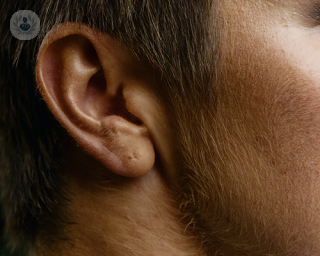

Post-operative recommendations for middle ear and mastoid surgery: What can patients expect
By Mr Harry Powell
2024-11-21
Mr Harry Powell, leading consultant ENT surgeon, provides an expert post-operative care guide for middle ear surgery, the term for various surgical procedures that treat problems or conditions which affect the tympanic membrane, the ossicles and the mastoid cells of the ear. See more
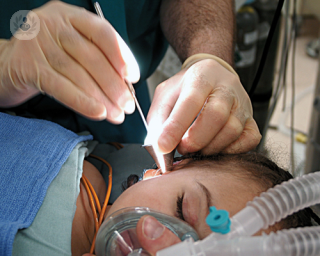

Silencing middle ear myoclonus (Part two)
By Professor Manohar Bance
2024-11-20
What is involved in middle ear myoclonus (MEM) diagnosis and treatment? Professor Manohar Bance, one of the UK's leading otologists, expertly answers this question in part two of his informative guide to this rare form of tinnitus. See more
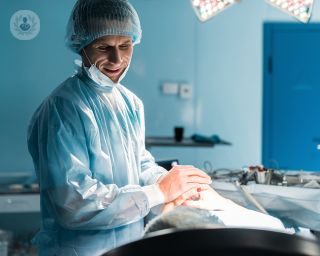

Endoscopy: a leap forward in ear surgery
By Mr Anthony Owa
2024-11-14
With the help of an endoscope, your doctor can send a tiny camera into your body to perform operations that were previously thought impossible. In previous articles we’ve looked at how everything from heart operations to knee replacements have benefitted from this technology. Today, we’re interviewing Mr Anthony Owa, celebrated ENT surgeon, about how the humble endoscope has revolutionised ear surgery. See more
Experts in Middle ear surgery
-
Mr Javier Moraleda
Otolaryngology / ENTExpert in:
- Vertigo
- Dizziness
- Hearing loss
- Tinnitus
- Ear wax plugs
- Middle ear surgery
-
Mr Michael Pringle
Otolaryngology / ENTExpert in:
- Middle ear surgery
- Deafness
- Tinnitus
- Cholesteatoma
- Paediatric ENT
- Tonsillitis
-
Professor Manohar Bance
Otolaryngology / ENTExpert in:
- Cochlear Implants
- Hearing loss
- Vertigo
- Ménière's disease
- Middle ear surgery
- Otitis
-
Mr Angus Waddell
Otolaryngology / ENTExpert in:
- Middle ear surgery
- Vertigo
- Dizziness
- Otology
- Tinnitus
- Hearing loss
-
Mr Julian Savage
Otolaryngology / ENTExpert in:
- Hearing loss
- Otology
- Dizziness
- Paediatric ENT
- Middle ear surgery
- Middle ear implants
- See all

The Ridgeway Hospital - part of Circle Health Group
The Ridgeway Hospital - part of Circle Health Group
Moormead Rd, Wroughton, Swindon SN4 9DD
No existe teléfono en el centro.
By using the telephone number provided by TOP DOCTORS, you automatically agree to let us use your phone number for statistical and commercial purposes. For further information, read our Privacy Policy
Top Doctors

The Blackheath Hospital - part of Circle Health Group
The Blackheath Hospital - part of Circle Health Group
40-42 Lee Terrace, Blackheath, London SE3 9UD
No existe teléfono en el centro.
By using the telephone number provided by TOP DOCTORS, you automatically agree to let us use your phone number for statistical and commercial purposes. For further information, read our Privacy Policy
Top Doctors

LycaHealth Canary Wharf
LycaHealth Canary Wharf
1 Westferry Circus, Canary Wharf. E14 4HD
No existe teléfono en el centro.
By using the telephone number provided by TOP DOCTORS, you automatically agree to let us use your phone number for statistical and commercial purposes. For further information, read our Privacy Policy
Top Doctors
-
The Ridgeway Hospital - part of Circle Health Group
Moormead Rd, Wroughton, Swindon SN4 9DD, SwindonExpert in:
- Breast Cancer
- General Surgery
- Orthopaedic surgery
- Plastic surgery, reconstructive and aesthetics
- Refractive surgery
- Cancer screening clinic
-
The Blackheath Hospital - part of Circle Health Group
40-42 Lee Terrace, Blackheath, London SE3 9UD, East LondonExpert in:
- Vascular Surgery
- Cardiology
- Bariatric Surgery
- Colorectal surgery
- Endocrine Surgery
- General Surgery
-
LycaHealth Canary Wharf
1 Westferry Circus, Canary Wharf. E14 4HD, Central LondonExpert in:
- Cardiology
- Dermatology
- Diagnostic Imaging
- Women’s health
- See all
- Most viewed diseases, medical tests, and treatments
- Migraine
- Minimal access surgery (keyhole surgery)
- Head and neck cancer
- Neck lump
- Botulinum toxin (Botox™)
- Thyroid disorders
- Anti-ageing treatments
- Medicolegal
- Ear wax plugs
- Vertigo
